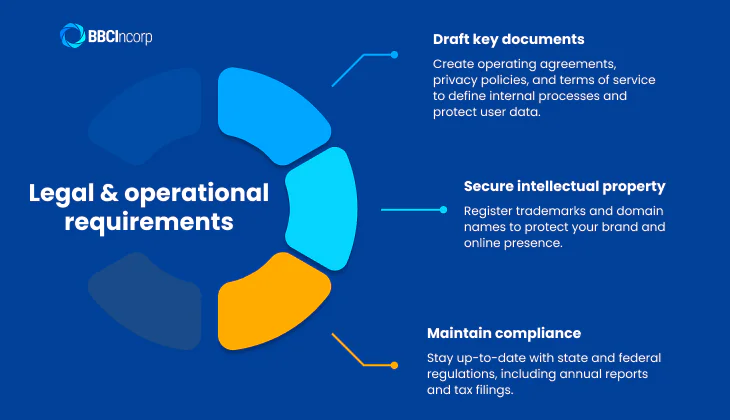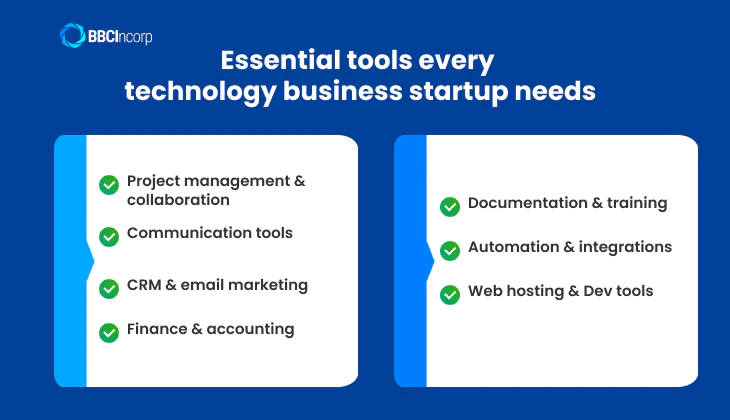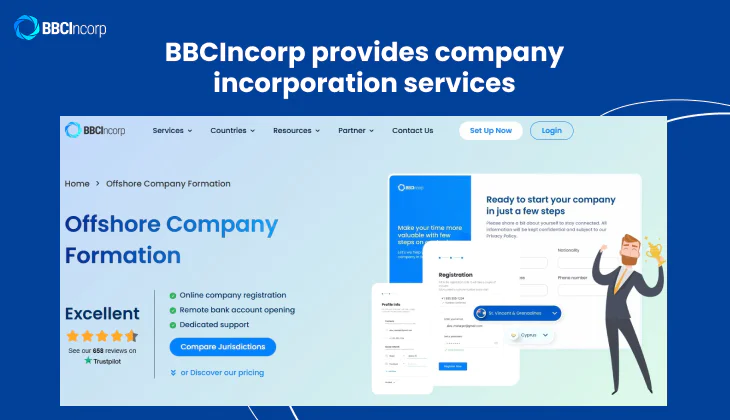
Table of Contents
The tech industry continues to captivate entrepreneurs, offering vast opportunities for innovation and growth. With the U.S. tech sector contributing around 8.9%(1) to the national GDP in 2024, the allure of launching a tech startup remains strong.
However, transforming a technology business startup idea into a registered, funded, and scalable company requires strategic planning and execution. This blog post will guide you through the essential steps on how to start a tech company, from validating your concept to securing funding and scaling your operations.
Whether you’re exploring how to start your own technology company or seeking to refine your startup strategy, this comprehensive guide is tailored for aspiring U.S. tech entrepreneurs.
Understanding what a tech startup is
In today’s digital age, tech startups are revolutionizing industries by leveraging technology to solve complex problems. Understanding what a tech startup is can provide valuable insights for aspiring entrepreneurs and investors alike.
What is a tech startup?
A tech startup is an early-stage company focused on developing and bringing innovative technology products or services to market. These ventures aim to disrupt existing markets or create entirely new ones through technological innovation.

Unlike traditional businesses, tech startups often operate under conditions of extreme uncertainty, seeking scalable and repeatable business models.
Key differences between a tech start-up and a traditional business?
While both tech startups and traditional businesses aim for profitability, their approaches differ significantly:
- Innovation and disruption: Tech startups prioritize innovation, often introducing groundbreaking technologies or business models.
- Growth trajectory: Tech startups typically pursue rapid growth and scalability, often with the goal of capturing significant market share quickly.
- Risk and uncertainty: Tech startups operate in high-risk environments with uncertain outcomes, whereas traditional businesses often follow established models with more predictable results.
Popular types of tech startup today
The tech startup landscape is diverse, encompassing various sectors:
- Artificial Intelligence (AI): Startups developing AI-driven solutions for industries like healthcare, finance, and logistics.
- Fintech: Companies offering innovative financial services, such as digital banking and blockchain-based solutions.
- Health Tech: Startups creating technology to improve healthcare delivery and patient outcomes.
- E-commerce Platforms: Businesses providing online marketplaces or enhancing digital retail experiences.
The global nature of tech startups
Tech startups inherently possess a global outlook, often designing products and services for international markets from inception. This global mindset enables them to tap into diverse talent pools, access broader customer bases, and attract international investment.
In an increasingly interconnected world, the success of a tech startup often hinges on its ability to scale and adapt across different regions and cultures.
Planning your tech business strategy
Planning your tech business strategy lays the groundwork for turning an idea into a viable venture. This section explores how to validate your concept, research your target market, and build a scalable foundation.
Identifying a problem and validating the idea
The cornerstone of starting a tech business is identifying a genuine problem that needs solving. Begin by observing inefficiencies or gaps in existing solutions and consider how technology can address them. Engaging with potential users through interviews and surveys can provide valuable insights into their pain points.
Once you’ve pinpointed a problem, validate your solution by developing a Minimum Viable Product (MVP). An MVP allows you to test your concept with minimal resources, gathering feedback to refine your offering.
Tools like Google Trends can help assess market interest, while platforms like Product Hunt and Reddit communities offer avenues to gauge user reactions and gather feedback. Creating a pre-launch landing page can also be effective in measuring interest and collecting early sign-ups, providing further validation of your idea.
Choosing the right tech business model
Selecting an appropriate business model is vital for the sustainability of your technology business startup. Common models include:
- Subscription (SaaS): Customers pay a recurring fee for continuous access to your software.
- Marketplace: Facilitates transactions between buyers and sellers, earning revenue through commissions or listing fees.
- Usage-based: Charges customers based on their consumption levels, aligning costs with usage.
- Freemium: Offers basic services for free while charging for premium features or services.
Assess which model aligns best with your target market and the nature of your solution. For instance, a SaaS model may suit enterprise software, while a freemium approach could be effective for consumer apps.
It’s essential to consider monetization strategies early, as investors often look for clear revenue generation plans. Understanding your customers’ willingness to pay and the value they derive from your product will guide you in choosing the most suitable model for your tech startup business.
How do you start a tech company: Register and legally set up your business
Registering and legally setting up your tech company is a foundational step in launching a successful technology startup. This process involves selecting the appropriate legal structure, choosing the optimal state for incorporation, and ensuring compliance with essential legal and operational requirements.
Legal structure and business registration
Establishing the right legal foundation is essential for your technology startup’s success.
Choosing the right business structure for your tech startup
When starting a tech business, selecting the appropriate legal structure is crucial. The two most common options are Limited Liability Companies (LLCs) and C Corporations (C-Corps).
- LLC: Offers flexibility and pass-through taxation, meaning profits and losses are reported on the owners’ personal tax returns. This structure is simpler to manage and may be suitable for small tech businesses not seeking external investment.
- C-corp: Preferred by many tech startup companies aiming for significant growth and external funding. C-Corps can issue multiple classes of stock, making it easier to attract venture capital and institutional investors. However, they are subject to double taxation—once at the corporate level and again on shareholders’ dividends.
Choosing the right structure depends on your business goals, funding plans, and operational preferences.
Best states to register your tech company in the U.S.
Selecting the state of incorporation impacts your technology startup’s legal and tax obligations. Delaware is a popular choice due to its business-friendly laws, well-established legal system, and favorable tax policies. Many investors prefer Delaware C-Corps, making it advantageous for startups seeking funding.
Other states like Wyoming and Nevada also offer benefits such as low taxes and simplified regulations, which may be appealing depending on your specific needs.
How to register your tech company and get an EIN
To legally establish your tech startup company:
- Choose a business name: Ensure it’s unique and complies with state naming requirements.
- Select a registered agent: Designate an individual or service to receive legal documents on behalf of your company.
- File formation documents: Submit the necessary paperwork (e.g., Articles of Incorporation for C-Corps or Articles of Organization for LLCs) to your chosen state’s Secretary of State office.
- Obtain an EIN: Apply for an Employer Identification Number from the IRS, which is required for tax purposes and opening a business bank account.
Legal & operational requirements
Beyond registration, your tech startup must adhere to ongoing legal and operational obligations:
- Draft key documents: Create operating agreements, privacy policies, and terms of service to define internal processes and protect user data.
- Secure intellectual property: Register trademarks and domain names to protect your brand and online presence.
- Maintain compliance: Stay up-to-date with state and federal regulations, including annual reports and tax filings.
By carefully navigating these steps, you lay a solid foundation for your technology business startup, positioning it for growth and success in the competitive tech industry.

Build your product and assemble a strong tech team
Building a successful tech startup starts with developing your MVP and assembling a capable team. This stage sets the foundation to start a tech business that is scalable, fundable, and market-ready.
Building the first version (MVP)
Creating a Minimum Viable Product (MVP) is a smart first step when learning how to start a tech startup. It lets you test your core idea using minimal resources, gather user feedback, and attract potential investors. Depending on your technical skills and startup budget, you can choose from several development approaches:
- No-code tools: Platforms like Bubble or Glide enable rapid prototyping without deep programming knowledge—perfect for entrepreneurs exploring how to start a tech company with no experience.
- Outsourcing: Hiring freelancers or development agencies can speed up the build process, especially if you lack an internal tech team.
- In-house development: Assembling your own development team offers the most control and flexibility, though it requires a higher upfront investment.
Selecting the right tech stack is critical when figuring out how to build a tech startup. Consider factors such as scalability, speed of development, and developer community support. For example, Ruby on Rails is popular for fast MVP launches—an ideal framework for tech for startups.
Hiring and team formation
Assembling the right team is essential when planning how to startup a tech company. The people you bring in early will shape the culture and direction of your startup.
- Finding co-founders and early team members: Use startup networking events, incubators, and founder communities to meet like-minded individuals. This is key when you’re trying to start a tech business that can grow fast.
- Equity vs. salary compensation: Most technology startups offer equity to early employees in place of high salaries. Be transparent about your startup’s potential and growth trajectory.
- Collaborating with freelancers or agencies: Freelancers and dev agencies are great for specialized tasks and short-term needs. Platforms like Upwork and Toptal are commonly used by founders learning how to build a tech startup efficiently.
When hiring, prioritize candidates who align with your company’s vision and culture. Early hires significantly influence your startup’s trajectory, so seek individuals who are adaptable, mission-driven, and capable of wearing multiple hats.
Fundraising, launching, and scaling your tech company
Starting up a tech company and growing it successfully, founders must secure funding, plan a strategic launch, and prepare for long-term scalability. This section explores practical steps for tech startup fundraising, launching your MVP, and building the foundation for a scalable tech startup business.
Funding options for tech startups
When considering how to start a tech business with no money, several funding avenues are available:
- Bootstrapping: Utilizing personal savings or reinvesting early revenues allows you to maintain full control but may limit rapid growth.
- Angel investors: High-net-worth individuals who provide early-stage capital in exchange for equity. They often offer mentorship and industry connections.
- Venture capital (VC): VC firms invest in startups with high growth potential, providing substantial funding and strategic guidance. However, they typically require significant equity stakes.
- Crowdfunding: Platforms like WeFunder enable you to raise funds from a broad audience, turning early adopters into investors and brand advocates.
To attract these investors, prepare a compelling pitch deck highlighting your value proposition, market analysis, business model, and financial projections. Participating in accelerator programs can also provide seed funding, mentorship, and networking opportunities.
Launch and growth strategy
Launching your tech startup effectively sets the stage for scaling:
- Beta testing: Engage early users through platforms like Product Hunt or BetaList to gather feedback and refine your product.
- Scaling operations: As you grow, invest in scalable infrastructure, hire key personnel, and streamline processes to handle increased demand.
- Key metrics: Monitor Customer Acquisition Cost (CAC), Lifetime Value (LTV), and Monthly Recurring Revenue (MRR) to assess financial health and inform strategic decisions.
- Future fundraising: Plan for subsequent funding rounds (Seed, Series A) by demonstrating traction, a scalable business model, and a clear path to profitability.
By carefully selecting funding sources, executing a strategic launch, and focusing on key growth metrics, you can effectively start up a technology company and position it for long-term success.
Essential tools every technology business startup needs
Every technology business startup needs a reliable suite of tools to stay organized, efficient, and scalable. From project management to analytics, the right setup can define how to start a technology company.

Project management & collaboration
Use platforms like Notion, Trello, or ProofHub to plan tasks, document product specs, and streamline teamwork. Notion is praised for its all‑in‑one workspace features, while Trello excels at visual task tracking
Communication tools
Slack or Microsoft Teams enable seamless, real‑time conversations—essential when you start a tech business with remote or distributed teams.
CRM & email marketing
HubSpot and Mailchimp are top choices for managing leads and outreach. Mailchimp’s templates and campaign tools help startups launch with minimal marketing expertise.
Finance & accounting
QuickBooks offers solid accounting capabilities tailored for founders starting a tech startup. It automates invoicing, expense tracking, and reporting.
Documentation & training
Tools like Whale help centralize internal documentation and team onboarding—crucial when scaling operations.
Automation & integrations
Zapier connects your tech for startups stack—like linking form submissions, CRM updates, and more—reducing manual work and errors.
Web hosting & Dev tools
Hostinger, AWS, or Google Cloud provide scalable infrastructure for your MVP and iteration cycles. Combine with GitHub for version control and developer collaboration.
Common challenges and how to overcome them
Starting a tech startup is an exciting journey, but it’s fraught with challenges that can derail even the most promising ventures. Understanding these pitfalls and how to navigate them is crucial for any technology startup aiming for success.
Lack of product-market fit
One of the primary reasons tech startups fail is the absence of a product-market fit. Without a clear understanding of customer needs, even the most innovative products can fall flat. For instance, the Apple Newton, a precursor to the iPhone, was ahead of its time but failed due to market readiness and consumer understanding.
Funding delays
Securing capital is often a significant hurdle. Many startups face delays in funding, leading to cash flow issues that can halt progress. It’s essential to have a clear financial plan and explore various funding options, including angel investors, venture capital, and crowdfunding.
Hiring the wrong people
Building the right team is vital. According to research, 18% of startups fail(2) due to team issues, including poor leadership and internal conflicts. Ensuring that team members align with the company’s vision and culture can mitigate this risk.
Importance of mentorship and networking
Navigating the startup landscape can be daunting. Seeking mentorship and building a strong network can provide guidance and open doors to opportunities. Engaging with experienced entrepreneurs and industry experts can offer valuable insights and support.
Resilience in the face of adversity
Resilience is the cornerstone of startup success. Embracing failure as a learning opportunity and adapting to challenges can lead to growth and eventual success. Many successful entrepreneurs have faced setbacks but persevered, turning their experiences into stepping stones for achievement.
BBCIncorp provides company incorporation services for technology startup
BBCIncorp is a global incorporation specialist with deep expertise in supporting technology startup founders launch their ventures. We’ve delivered end-to-end services, including international company formation services, bank account setup, and corporate compliance, across 18+ jurisdictions, with a strong focus on the American market.
Our services also extend to key innovation-friendly jurisdictions. For startups seeking privacy and flexibility, the BVI company register offers an efficient gateway. Those needing robust legal structures and investor confidence can benefit from our corporate advice in the Cayman Islands, a favored hub for global tech funds. We also support Cyprus companies registration, ideal for EU-based fintech operations thanks to its favorable tax regime and regulatory alignment.
Our digital-first platform, tailored support, and transparent pricing set us apart: we streamline the entire process so founders can focus on innovation, not paperwork.

Why choose BBCIncorp?
- Digital all-in-one portal: simplifies setup, administration, and compliance.
- Dedicated local experts: guide you on regulations and best practices in your target country.
- Clear, upfront pricing: no hidden fees or surprise charges.
For U.S.-based incorporation, BBCIncorp offers clear pricing structures to suit different startup needs. Incorporation packages for a Delaware C-Corp or LLC start at USD 899, which includes essential services like business name availability checks, state filing, and registered agent services.
Comprehensive packages that include EIN registration and post-incorporation support are also available, providing excellent value for small tech startups planning to scale.
Conclusion
Starting a tech company requires more than just a great idea, it demands clear execution at every stage. From identifying a real-world problem and validating your solution with an MVP, to selecting the right business model and legal structure, each step lays the groundwork for success. Building a capable team, securing early funding, and scaling your technology startup strategically are all critical for long-term growth.
Whether you’re exploring how to start a tech company with no experience or planning to launch your second tech startup, the process is achievable with the right tools, research, and support. The U.S. remains one of the most founder-friendly environments for launching a tech startup business, especially in states like Delaware.
If you’re ready to move forward or need guidance on incorporation, planning, or investor readiness, our startup consultants are here to help. Contact us to start building your tech company today.
*References:
(1) https://scottmax.com/tech-statistics/
(2) https://explodingtopics.com/blog/startup-failure-stats
Frequently Asked Questions
Can a non-U.S. resident legally register a tech company in the United States?
Yes. Non-U.S. residents can legally form a U.S. LLC or corporation without living in the country. Foreign founders often choose Delaware LLCs or C‑Corps due to founder‑ and investor‑friendly laws. Setting up requires a registered agent and may include extra IRS documentation, such as for obtaining an EIN. It’s a common path for those looking to start a tech company in America
What are the typical costs involved in forming and launching a tech startup?
Key expenses include:
- Formation fees (state filing, registered agent, EIN): often range from $500–$1,500.
- Technology and staffing: Salaries or freelancer fees can quickly reach $100K+ annually.
- Operational costs: such as servers, software, marketing, and legal—typically $50,000–$200,000 in the first year, depending on scope.
Experts recommend budgeting at least 18 months of runway to cover developing your MVP and scaling
Why is protecting intellectual property critical for a tech business?
IP protection, such as patents, trademarks, and copyrights, is essential in the tech industry. It secures your innovations, creates a competitive edge, attracts investors, and enhances valuation. A strong IP strategy prevents competitors from copying your work and helps avoid costly legal disputes. For many tech startups, IP is a core business asset.
Is it hard to start a tech company?
Yes, launching a tech startup is challenging. First, you need a strong product-market fit–without which even innovative ideas may fail. Funding can be unpredictable, hiring the right team is critical, and the competition is intense. Success depends on resilience, strategic planning, networking, and mentorship. Many entrepreneurs describe the process as difficult but ultimately rewarding.
Disclaimer: While BBCIncorp strives to make the information on this website as timely and accurate as possible, the information itself is for reference purposes only. You should not substitute the information provided in this article for competent legal advice. Feel free to contact BBCIncorp’s customer services for advice on your specific cases.
Industry News & Insights
Get helpful tips and info from our newsletter!
Stay in the know and be empowered with our strategic how-tos, resources, and guidelines.





